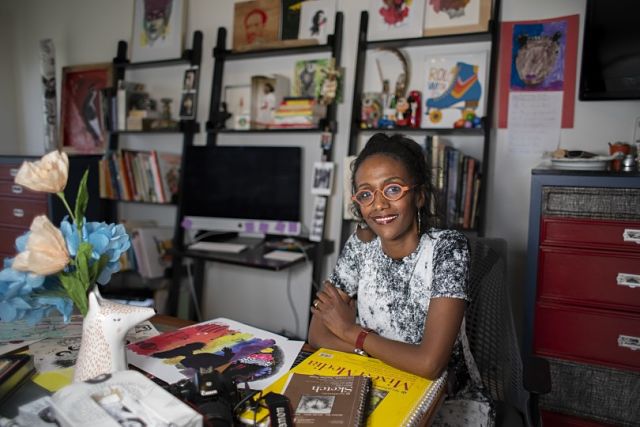Ethiopian-American artist Netsanet Tesfay on art as stress relief, connection
As a child growing up in Ambo, Ethiopia, Netsanet Tesfay recalls sitting at the kitchen table for hours at a time, drawing everything her eyes fell upon: pots, pans, a long-necked jebana — or kettle — for coffee.
Today, the Walnut Creek artist and mother of two known for her bold and bright female imagery — “Resist: Frida in pussy hat” was featured in the Bedford Gallery’s “World of Frida” exhibition —- is finding inspiration in much the same way, especially during spring’s shelter-in-place. Tesfay, 43, recently illustrated a 32-page coloring book celebrating Walnut Creek open space and talked to us about art as a tool for mental health.
Q: Can you tell us about the Ethiopian women in your work and why they speak to you as an artist?
A: Women in Africa play a huge role in families. They’re powerful in that way. We carry our families metaphorically and literally on our backs. The women of Southern Ethiopia’s Omo Valley, in particular, are members of a group of indigenous tribes that have lived peacefully for centuries. In the Suri tribe, it is customary to adorn the body with floral arrangements, clay accessories and paint. I find inspiration in their beauty and grace. And right now, these populations are being forcibly displaced, and it breaks my heart.
Q: Is there a place for art not just as creative expression, but as stress relief?
A: Yes, this is something artists think about a lot. A recent study in the Journal of American Art Therapy Association found that 45 minutes of making art reduces stress hormones. And this is at any level. There’s no talent required. If you can draw a line, you’re good. When I find my kids fighting — it’s always around 4:30 p.m. — I get out the art supplies, and we have a sort of Zen moment. After 45 minutes, they are happy. They are relaxed. And they are kinder to each other.

Netsanet Tesfay poses for a photograph at home in Walnut Creek, on Saturday, May 16, 2020. (Bay Area News Group)
Q: What is the role of art amid crisis?
A: In the middle of catastrophe, especially during times of loss, we’re at our most vulnerable and looking to experience that together. Catastrophe calls for connection, and art allows for that to happen. We’re looking for something positive, the best in ourselves. People are finding solace, inspiration and refuge in that.
Art is a savior for a lot of people. And it doesn’t have to be art as we think of it. People are baking more. Gardening. Anything where we use our brains differently.
Q: Does coloring count? What do you make of the rise in coloring books for adults?
A: I think it’s a fantastic practice for our mental health, like meditation or exercise. It switches off the brain and requires zero skills. It immediately puts you at ease and in a safe zone. It’s about finding an activity that comes with no judgment. I don’t think a lot of people realize that we spend most of our time in our left brain. I think switching to the other side brings about consciousness.
WALNUT CREEK, CA – MAY 16: Art work by Ethiopian illustrator Net Tesfay is photographed in Walnut Creek, on Saturday, May 16, 2020. (Anda Chu/Bay Area News Group)
Q: You recently helped create a coloring book for your community. How did that come about?
A: When the pandemic happened, it felt like a rug was pulled out from under me. I wanted to make sure people were OK, that they had something to do during shelter-in-place. Our PTA at Walnut Heights Elementary School came to me with the idea of doing a coloring book to celebrate the 50th anniversary of The Nature Area, a three-acre open space behind the school with a pond, pollinator garden, edible garden and amphitheater. It is a treasure and resource for the community.
The book, which is inspired by the Walnut Heights Nature Area coloring book
originally published by the PTA in 1982, has 32 pages and 60 images of the native plant and wildlife, along with blurbs. Every child at the school received a coloring book. We’re hoping it will motivate them to care about nature.